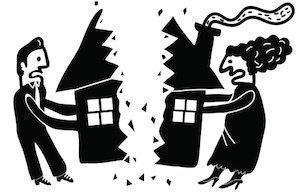Commingling Assets: Dividing Property in Illinois Divorce
Posted on April 06, 2014 in Divorce
 Dividing assets between spouses is always an important part of a divorce in Illinois. Many residents are familiar with the idea that all property is labeled as either marital or non-marital. Under Illinois law, property owned by one spouse before the marriage is usually deemed non-marital property and anything acquired during the marriage is labeled marital property. Generally, all marital property is split “equitably” (a nuanced term), while non-marital property remains with the original owner.
Dividing assets between spouses is always an important part of a divorce in Illinois. Many residents are familiar with the idea that all property is labeled as either marital or non-marital. Under Illinois law, property owned by one spouse before the marriage is usually deemed non-marital property and anything acquired during the marriage is labeled marital property. Generally, all marital property is split “equitably” (a nuanced term), while non-marital property remains with the original owner.
However, that brief overview drastically simplifies how complex the property distribution process can get. This is particularly true when significant assets are at stake, such as in
high-net worth divorces. The most bitter feuds in divorces often involve property allocation when parties disagree on whether certain assets should be labeled marital or non-marital.
Understanding Commingling
One property distribution complexity involves the co-mingling of marital and non-marital assets during a marriage. For example, consider a husband who receives a cash inheritance after a relative passes away. Can the husband later claim during divorce that the cash should remain outside of the marital estate? Typically, an inheritance given directly to one spouse is deemed non-marital property. However, the inheritance may actually become marital depending on what is done with the inheritance afterwards.
To determine if the inheritance becomes marital property, the asset must be “traced” from the time it was acquired until the time of the divorce. If the cash was deposited into a joint bank account from which all manner of joint purchases were made, then the inheritance may be “transmuted” into marital property. Alternatively, if the inheritance money was used to immediately acquire another asset (i.e. a car), then new property may still be deemed non-marital.
It is easy to envision many different circumstances where the tracing process can be quite complex. The longer a marriage, the more complex the tracing that may be needed. Illinois courts usually favor classifying property as marital. Under the law, the party claiming that an asset is non-marital typically has the burden of proving it. Meeting that burden is often a challenge, and may require scouring financial records, bank statements, estate planning documents, and similar material. At times even expert witnesses must be called, like accountants and other financial professionals, to show that non-marital assets were not commingled to the extent that their character remains the same.
Contact an Attorney
The labeling of property during divorce is frequently a hotly debated issue. That is why you need an aggressive advocate on your side who is experienced in complex issues related to commingled assets and state tracing requirements. For help in suburban Illinois, including Kane County, DuPage County, and many other communities, please
contact the attorneys at Goostree Law Group today.
 Dividing assets between spouses is always an important part of a divorce in Illinois. Many residents are familiar with the idea that all property is labeled as either marital or non-marital. Under Illinois law, property owned by one spouse before the marriage is usually deemed non-marital property and anything acquired during the marriage is labeled marital property. Generally, all marital property is split “equitably” (a nuanced term), while non-marital property remains with the original owner.
Dividing assets between spouses is always an important part of a divorce in Illinois. Many residents are familiar with the idea that all property is labeled as either marital or non-marital. Under Illinois law, property owned by one spouse before the marriage is usually deemed non-marital property and anything acquired during the marriage is labeled marital property. Generally, all marital property is split “equitably” (a nuanced term), while non-marital property remains with the original owner.










